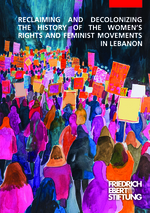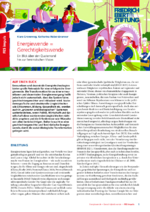Feminism has always challenged social circumstances and demanded more justice. Courageous and committed feminists tirelessly advocated for human dignity and the legal and factual equality of women, and many positive changes were achieved.
Despite all the successes, the battles against oppression are by no means a thing of the past. In many places, they are more topical than ever: in Europe and the U.S., right-wing populist parties have emerged in recent years, wanting to turn back the clock, including with regard to gender relations. In Latin America, as one example conservative social forces have placed the right to abortion under pressure, and there are cases of conservative attacks on women's rights in many countries in Africa, Asia and the Arab world. Not to mention the increasing number of attacks on the so-called "gender ideology" and LGBTIQ rights.
The feminist struggle has moved to the centre of the large political conflicts of our time. Right-wing populists need clear enemies and are always looking for polarizing issues. Gender issues are often discussed emotionally and have become – along with migration issues – one of the central battlegrounds of current political confrontations.
But feminists worldwide are not willing to accept these setbacks. Many of the most prominent social protest movements of recent years were and are feminist. In mass protests on the streets, for instance in Latin America, where the protests spread from Argentina across the continent under the catch phrase "Ni Una Menos" (not one [woman] less). In South Africa, where activists achieved an online and offline large-scale mobilization against the endemic violence against women, calling for a #TotalShutDown. And on the Internet: where resistance to social circumstances repeatedly makes its way into the social media – for example under the hash tag #metoo and #timesup.
Feminist views on the future of work
In the very prominent debate on digitalization and the future of work, important aspects from a feminist perspective are currently being neglected. While the main drivers are from international organizations and global forums, feminist and labour movement voices from the Global South are rarely heard. It is time for a critical feminist review as the economic discrimination against and economic inequality of women is still one of the most serious concerns of our time.
As part of the "The Future is Feminist" project, the Friedrich-Ebert-Stiftung is working together with feminists worldwide, particularly from the Africa, Asia & Pacific, MENA, Latin America & the Caribbean region, discussing common concerns of the feminist and labour movement in order to create space for new powerful alliances aiming at social change. Together, we want to discuss and express feminist perspectives on the future of our societies. After all, the economic discrimination of women around the world is still one of the most severe inequality problems of our time.
Therefore, one focus of our work at the global level is on economic policy issues and critical economic perspectives. In doing so, we want to follow up on the discussions about the effects of digitization and the future of work: What does the future of work look like from a feminist perspective? Where are the blind spots in on-going debates? What questions are being concealed by the digitization hype?
The following topics will be at the focus of the project:
- Care work & reproduction
- Feminist alternatives beyond old development models and
- A feminist framework for digitalization.
Those who need to benefit from improvements the most are rarely at the focus of new innovations. This project wants to change that narrative and provide new ideas in order to contribute to justice, equal opportunities and respect for human dignity for all!
The project is a continuation of the work of feminist networks with which our local offices cooperate in the Asia and the Pacific, Latin America and the Caribbean, the Middle East and Northern Africa, and sub-Saharan Africa regions. It offers activists the opportunity to exchange ideas on burning issues, regional experiences and political strategies, and serves as a space to experiment with new ideas and projects.
Despite all the opposition, we are sure: The Progressive Future is Feminist!



